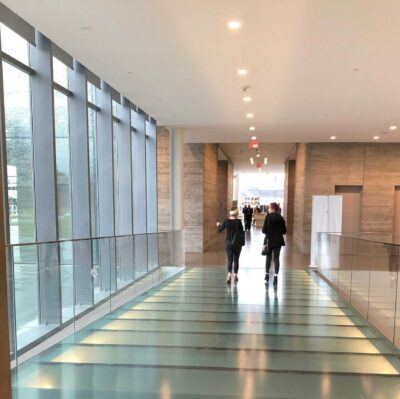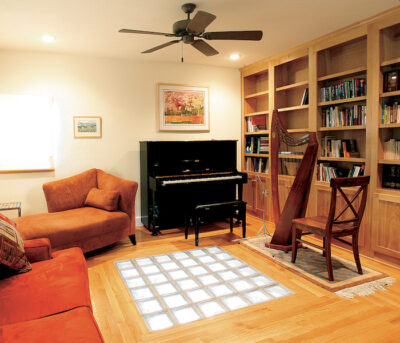Are Glass Floors Safe?
Glass floors are increasingly popular in both commercial and residential settings due to their striking aesthetic and functional benefits. Wherever they are used, they evoke a sense of openness and walking on air.
An Elegant Choice in Residential and Commercial Applications
In commercial buildings, glass floors offer a modern, open look, enhancing the perception of space and light. These floors are often used in showrooms, museums, and offices, creating a sense of transparency and sophistication. The ability to transmit natural light from one level to another reduces the need for artificial lighting, contributing to energy efficiency and a pleasant working environment.
In residential spaces, glass floors add a unique touch of luxury and modernity. Homeowners use them in areas like stair landings, wine cellars, and balconies to create visually stunning effects.

The transparency of glass floors can make rooms feel larger and more connected. When strategically placed, they can also provide unique views, such as a glass floor above a wine cellar or an aquarium, adding an element of surprise and interest to home design.
Are Glass Floors Safe? As Safe as Any Flooring Surface
Thanks to their transparency and sense of weightlessness, a common question from property owners is: “Are glass floors safe?” The answer is yes; glass floors are safe when designed and installed correctly. Structural glass used in flooring applications is engineered to be exceptionally strong and durable. Glass floors are made from fully tempered (meaning heat-treated for strength), laminated glass, which is significantly stronger than standard glass. The lamination process involves bonding multiple layers of glass with interlayers, often made of polyvinyl butyral (PVB) or other robust materials, enhancing impact resistance and preventing shattering.
Safety features are a crucial consideration in the design of glass floors. One such feature is the anti-slip treatment applied to the walking surface. GlassWalk™ Structural Glass Floor Systems, for example, offer traction control frit patterns permanently fused to the top surface of the glass, ensuring slip resistance. This treatment meets or exceeds stringent code requirements, making glass floors safe for pedestrian traffic. Additionally, acid etching can be used to create an anti-slip surface, providing an extra layer of safety.
Support is Critical to Safety
Another factor when considering the question: “Are glass floors safe?” is the framework that holds and secures the flooring. The support structure of glass floors is critical to the safety of a glass floor. High-quality systems, like those from GlassWalk, use an aluminum grid to hold the glass panels. These grids are strong yet lightweight, often made from aluminum with a significant portion of post-consumer recycled content. The aluminum framework is designed to be modular, allowing for easy customization and ensuring that the glass panels fit securely and stably. The modular design also facilitates installation and a perfect fit, ensuring that each component is correctly placed and secured.
Testing and compliance with building codes are essential for ensuring the safety of glass floors. Reputable manufacturers such as GlassWalk subject their glass floor systems to rigorous testing in independent laboratories to meet or exceed load and impact requirements. This testing process ensures that the floors can support the weight of people and objects without compromising the safety or the integrity of the glass or support systems.
Maintenance plays a role in the long-term safety and durability of glass floors, and clients or end-users should be informed of how to clean and maintain their glass floors. Regular inspections and cleaning are necessary to maintain the anti-slip surface and to check for any signs of wear or damage. Proper maintenance helps prevent issues such as scratches or chips that could affect the performance and safety of the glass floor.
Resistance to Deterioration
Modern architectural glass is an inherently durable and inert material. It is treated or coated to enhance its durability and resistance to environmental factors. Under normal conditions, it does not undergo significant deterioration, particularly when it is used indoors. However, some factors can cause the deterioration of its appearance or performance over time. This deterioration won’t necessarily make the glass floors unsafe. Still, they include: exposure to the elements, exposure to corrosive materials, and alkali-silica reaction (or ASR, a reaction that can take place when glass is in contact with concrete).

Indoors or out, glass floors are also susceptible to scratches and abrasions, so choose non-abrasive cleaners designed for glass floors. Glass floors can also be affected by moisture infiltration. Improperly sealed joints or damaged seals can allow moisture to infiltrate between glass layers or at the edges, potentially leading to degradation of the supporting materials.
Specify GlassWalk Floors with Confidence
Architects and interior designers find glass flooring to be a versatile and innovative material that can significantly enhance the visual appeal of a space. The use of glass floors can create a seamless integration of indoor and outdoor environments, providing an uninterrupted view and enhancing natural light flow. Designers can also utilize glass floors to highlight specific areas, such as display cases or unique installations, making them focal points within the space. Furthermore, the customizable nature of glass floor systems, with options for various tints, textures, and patterns, allows for creative freedom in achieving the desired aesthetic while ensuring safety and functionality.
While the question “Are glass floors safe?” is valid, the answer lies in the quality of the materials, the design, and the installation process. When these factors are carefully managed, glass floors are not only safe but also a stunning and practical addition to any space. They combine the best of modern aesthetics with functional benefits, making them a valuable feature in both commercial and residential environments.
